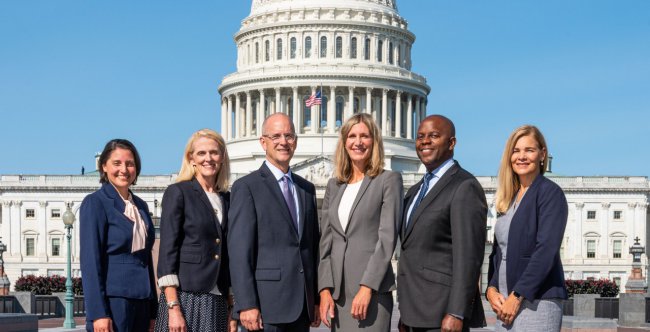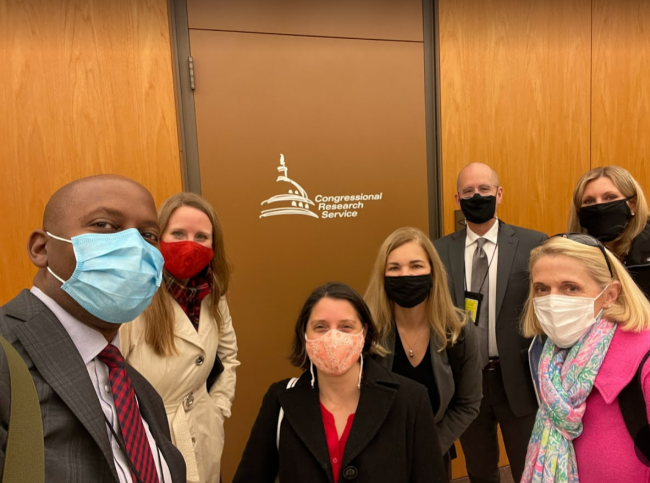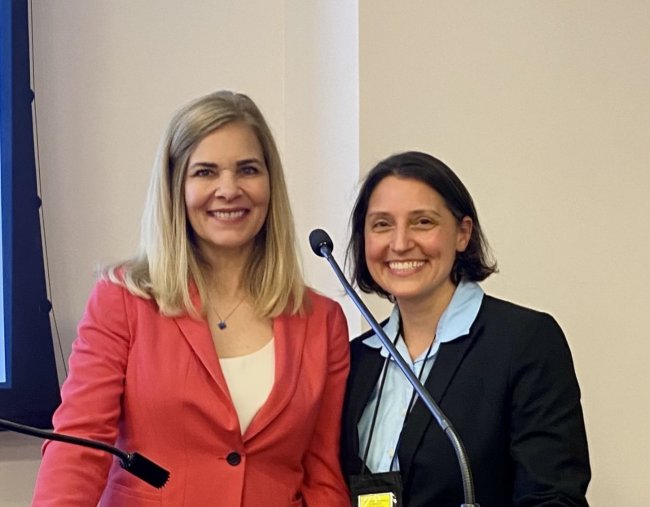“Knowledge is Power”: The RWJF Health Policy Fellows Program Gave Angie Perone the Tools to Become an Elder Health Policy Expert

Perone (far left) and other members of the 2021-2022 class of RWJF Fellows outside the U.S. Capitol.
Perone advocates for the health needs of LGBTQIA+ older adults
By Marisa Coulton
Angie Perone is one of California’s foremost elder health policy experts. She currently works at the University of California, Berkeley, where she serves as an assistant professor in the School of Social Welfare and director of the Center for the Advanced Study of Aging Services.
She is currently conducting research into equitable aging, asking, “How do we support both the recipients of the care and the caregivers, both formal and informal… in the long-term care system?” She’s also part of a team that is examining the policy needs of LGBTQIA+ older adults. The project is in collaboration with the state of California, and is the first of its kind.
Her interest in elder health care stems from a traumatic experience from her past.
“My grandfather got mesothelioma,” she said. “I didn’t know that’s what it was at the time; [my family was] told he had ‘cancer of the fluid,’ which makes no sense.”
The doctors did not elaborate, maybe because they assumed Perone’s rural, working class family would not be able to understand the finer details. Her mother was a hospital social worker and her father a food service worker. By stripping her family of information, Perone noted, they also stripped away their options.
Perone would go on to become a national and state leader in aging services and health, directing the only academic research center in the United States that focuses specifically on aging services. But that was much later, after she had a JD, PhD and the Robert Wood Johnson Foundation (RWJF) Health Policy Fellows program under her belt. As a teenager, she could only watch helplessly as her grandfather succumbed “very quickly, very painfully,” to mesothelioma, an aggressive disease developed through exposure to asbestos.
The experience lit a fire within Perone. It got her thinking about the deep disparities that exist in health care. She pursued a career in civil rights law, which gave her the opportunity to advocate for the health of people who were hurt in the workplace—people like her grandfather.
Not long into her legal career, however, Perone became frustrated. Practicing law, she felt, was reactive, rather than proactive. “With cases, you’re often dealing with something retrospectively,” she said. “Some damage has happened and you’re trying to find a remedy after it’s happened.”
Ideally, she wanted to help her clients before they had been hurt, not after. So Perone pivoted to preventative work in nonprofit policy and advocacy.
She worked as a staff attorney at the National Center for Lesbian Rights where she oversaw a national LGBTQIA+ Elder Law Program. “I worked closely with health care leaders in hospitals [and] nursing homes on how they could best serve LGBTQIA+ older adults before something bad happened,” she said. “As I continued to do more of that, I started to realize that I needed more training beyond the law.”
Then she completed a master’s in social work and a master’s in sociology followed by a doctorate in social work and sociology. She also did a two-year National Institutes of Health traineeship in the School of Public Health at the University of Michigan. She then served as the Executive Director of SAGE Metro Detroit (now MiGen), which focuses on services and advocacy for LGBTQIA+ older adults.
These roles taught her a great deal about the complexities of the health care system and the disparities that exist for populations that have been marginalized, such as LGBTQIA+ individuals, and families like her own, who reside in rural communities.

Perone (center) and other RWJF Fellows visiting the Congressional Research Service.
However, there was still a lot about the health care system that Perone didn’t understand. On-the-ground health policymaking remained a mystery to her. “I wanted to understand what really happens behind the scenes: how does a bill actually become a law, behind the secret doors,” she added.
The RWJF fellowship would be the perfect way to get there, she realized. Perone had known about the Robert Wood Johnson Foundation since graduate school. She identified with the organization’s mission of providing “every individual with a fair and just opportunity to thrive, no matter who they are, where they live, or how much money they have.”
She found out about the fellowship through the program’s email listserv, and applied to join the 2021-2022 cohort.
“It [was] a great group. [They were] really impressive individuals who [were] committed to improving health outcomes and eradicating health disparities in different ways.”
Each year, the RWJF Health Policy Fellows program selects six exceptional health professionals from across the country to take part in the 12-month fellowship. Perone was among them. She relocated to Washington, D.C., where she and the other fellows met with national health leaders, think tanks, interest groups, and more in order to gain an in-depth understanding of the American health policy landscape.
Perone loved the fellowship. “I thought it was great,” she said. The fellowship struck an “interesting, unique” balance, she said. On one hand, the program valued her mid-career expertise; on the other, it gave her the opportunity to learn the basics of policymaking.
The members of her cohort came from diverse ideological backgrounds. “It [was] a great group. [They were] really impressive individuals who [were] committed to improving health outcomes and eradicating health disparities in different ways.” She enjoyed hearing the fellows’ perspectives. Having worked in a community-level organization, she had valuable insights to offer, too.

Perone (right) with RWJF Fellow Kristin Ashford.
Perone was surprised to find that the atmosphere on Capitol Hill was collegial, rather than combative. “Behind the scenes, there’s a lot of bipartisan collaboration going on,” she said. “You just don’t see that [in mainstream media].”
She took up a placement in Senator Tammy Baldwin’s (D-WI) office, where she worked alongside an “exceptionally smart and thoughtful staff” to craft stronger regulatory guidance surrounding e-cigarettes, tobacco, and more.
After the fellowship, Perone continued to work in the federal government at the Centers for Medicare and Medicaid Services (CMS) to improve access and quality of care for older adults. “It was sort of… an extension of the fellowship,” she said, “that gave me a whole other lens of policymaking from the executive branch.”
At around the same time, Perone took up her current role at the University of California, Berkeley, where she is conducting research into equitable aging.
She’s also exploring the intersection between elder care and climate change, questioning how organizations can best support older adults and their caregivers amid increasing climate emergencies, such as extreme heat events.
Though her fellowship only ended in 2022, Perone has already been able to leverage her experience on Capitol Hill and with CMS in “really unique ways,” she said. “Now I’m positioned to be a leader in the state of California on policy efforts relating to aging in particular.”
Not only did the fellowship have a hand in her appointment to that role, but it also showed her how to excel, teaching her all the different ways she could be collaborative, supportive, and influential.
“I’m working really closely with the state of California on policymaking efforts in aging. My ability to do that and to be confident in [my recommendations] is a tribute to my experience in the fellowship.”
Throughout her career, Perone has carried the memory of her grandfather with her. Now, decades after his death, she has a much clearer understanding of his situation and how it could have been handled better.
If Perone could go back in time with the information she has now, she would ask more questions. Her family deserved more information than the doctors were willing to provide. “It wouldn’t have changed the outcome,” said Perone, “but the process of his death and the grieving process would have been a little bit different if we had known more about what was happening.”
For one, her family should have been made aware of the legal options that were available to them. The information should have been presented in a clear, transparent, comprehensive and culturally responsive way, she said. It should not have been diluted to make it more palatable. “Information is power,” she said. “Not providing information means you have different caregiving experiences, you have different health outcomes, you have different legal outcomes.”
While Perone cannot go back in time, she continues her work on aging policy in her grandfather’s honor, empowering others to ask the right questions.
“I’m working really closely with the state of California on policymaking efforts in aging,” she said. “My ability to do that and to be confident in [my recommendations] is a tribute to my experience in the fellowship,” she said.
The application period for the 2025-2026 class of RWJF Health Policy Fellows is open from August 1-November 1, 2024. Learn more at HealthPolicyFellows.org.
Follow the RWJF Health Policy Fellows program on LinkedIn or email info@healthpolicyfellows.org to get in touch.
About the author: Marisa Coulton is a journalist based in Toronto, Canada. She holds a Master of Journalism and a Master of International Affairs from Columbia University.
